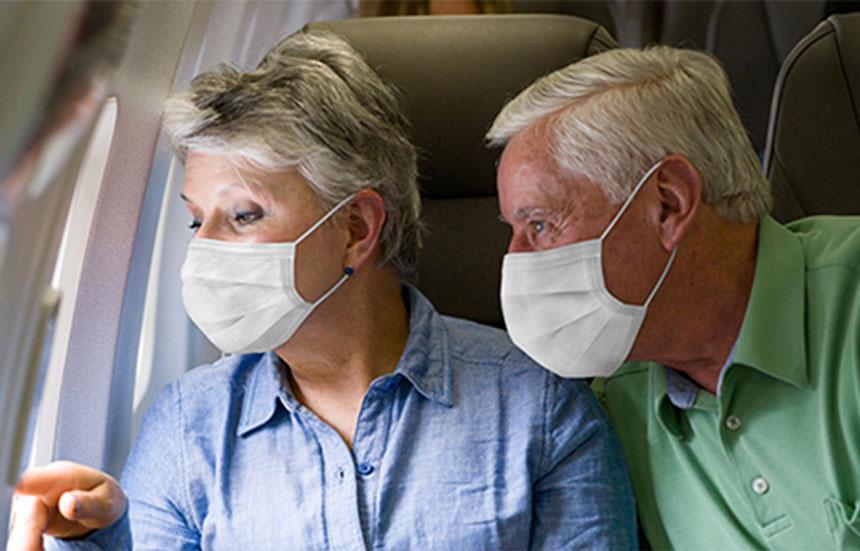Travel 2021: Vacationing During Covid

Vaccinated & Unvaccinated Travel
If you are fully vaccinated during the pandemic it is both safer and more convenient to travel. Still, the Centers for Disease Control and Prevention (CDC) recommends that you self-monitor for symptoms and wear a mask and socially distance while traveling, especially on public transportation (where it’s required) and in crowded areas. Even if you’re vaccinated, you can still catch and spread COVID.
For unvaccinated travelers, the CDC recommends that you get tested 1 to 3 days before travel; get tested 3 to 5 days after travel and self-quarantine for a week or self-quarantine for 10 days; self-monitor for symptoms and wear a mask and socially distance while traveling.
Travel restrictions for the unvaccinated vary by destination and mode of transport — even domestically. COVID infection hotspots are popping up across the U.S. In some states, where the percentage of people vaccinated are lower, officials are worried about overtaxed medical resources.
Here’s what else you need to know before hitting the road.
Locations
Many countries, including the United States, have established guidelines for travelers regarding COVID testing, vaccinations, quarantines and masks. Before you plan your trip, check out the CDC website to become familiar with guidelines for domestic and international travel.
If you’re traveling with children under 12 that are too young to be vaccinated, the CDC recommends they follow all the same recommendations as unvaccinated adults. You can also ask your pediatrician for other options to minimize their risk.
“Children seem to have a much lower risk for complications from COVID-19,” says Bernard Kaminetsky, MD, medical director, MDVIP. “Cases tend to be a lot milder than adults. But they can catch it and spread it. This is something to consider if you’re visiting unvaccinated family or friends.”
Travel Mode
Air – There is a surge in air travel which means longer lines through security checks. To prevent missing your flight, you’ll need more time to get to the gate or use technology to speed up the process. One solution is enrolling in TSA PreCheck. And some airports have biometric and facial recognition technology, allowing passengers to check bags, pass through security and board planes. QR codes, which store data to make passenger transactions and check-ins a lot easier, also are available at some airports.
Since the pandemic, many airports have upgraded their technology to prevent the spread of germs. Many airports offer passengers a touchless check-in system that may include passenger and luggage check-in and boarding pass scan. Some airports have even installed thermal cameras that can detect passengers’ temperatures, flagging those who may be ill before they board the plane.
Federal guidelines require the use of masks while at the airport and on flights regardless of vaccination status. Patience is also thin — since many people returned to flying, the Federal Aviation Administration has reported significantly higher incidents of verbal and physical assaults to passengers and flight attendants this year. The federal mask mandate lasts until at least Sept. 13 and is expected to be extended to Jan 18 2022.
Many airlines have also replaced coach cabin meal service with a kit containing snacks and bottled water that’s packaged in a plastic bag.
Cruises – New CDC cruise guidelines have allowed the cruise industry to reopen.
Tight quarters on cruise ships raise the risk for a wide range of infectious diseases – not just coronaviruses. Over the past several years, cruise lines have added features like hands-free room entry and food and beverage order apps. But that didn’t keep them from being major sources of COVID-19 spread during the early days of the pandemic.
As the industry has come back, many cruise lines have adopted policies for pre-boarding and random onboard COVID-19 testing. Policies vary for each cruise line and port in which you’re boarding, so contact your cruise line for details.
Once you’re onboard, you may notice your ship has set-up vaccinated-only zones, reduced the capacity of many amenities, require reservations for dining and entertainment services, have social distancing and mask wearing policies, screen temperatures and have established COVID-19 testing clinics.
Other Forms of Public Transport – Whether you’re going by ferry, train or bus, the CDC’s guidelines around masking and social distancing are the same as planes – with one exception: Operators of conveyances with outdoor areas (the open top deck of a ferry or double-decker tour bus, for example) do not have to require masks. You can read more about the requirements here.
Hotels
Like other travel providers, many hotels have changed processes, policies and even room features to accommodate COVID safety guidelines.
Some hotels have upgraded their technology to let you check into and enter your room via your phone. You can also order room service, contact the front desk or schedule a service via apps. And more and more hotels are embracing touchless features such as motion-activated sinks, voice-controlled lights and thermostat and remote-less smart televisions.
Some daily operations also have changed. To limit guests’ and staff members’ exposure to germs, many hotels are only servicing rooms (e.g., changing linens, emptying waste paper baskets and restocking linens) between guests, as opposed to daily. Some have even put coffee and tea stations and breakfast buffets on hiatus.
Travel Activities and Amenities
If you plan on participating in typical vacation activities like going to the beach, eating out at restaurants or visiting theme parks, understand local ordinances and corporate policies of these establishments. You may have to wear a mask or make reservations due to low staffing or capacity.
Take Your Doctor’s Contact Information
It’s always a good idea to take your doctor’s contact information with you while you travel, but this is especially true if you’re a member of an MDVIP-affiliated practice. If you need urgent healthcare while you are traveling, your MDVIP-affiliated physician can help arrange your care with a local hospital, pharmacy or doctor, which may include an MDVIP-affiliated physician.
MDVIP also offers discounted Medjet® air medical transport and travel security memberships, for patients traveling more than 150 miles from home on business or pleasure, domestic or international trips. Medjet has added coverage for Medjet members who contract COVID while traveling. Visit Medjet to learn more.


